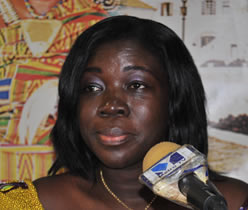Tourism fetched Ghana US$2.5 billion last year
- Posted on
- Comment
 Tourism fetched Ghana US$2.5 billion last year, confirming the sector as the fourth largest export after gold, cocoa and remittances.
Tourism fetched Ghana US$2.5 billion last year, confirming the sector as the fourth largest export after gold, cocoa and remittances.
The amount was spent by 1,263,857 international tourists who visited the country during the year, according to an official of the Ghana Tourism Authority (GTA) who disclosed this at the just-ended World Travel Market in London.
Ghana set a national target of one million arrivals five years ago and that target set by the Authority and was envisaged to be achieved by 2010.
The achievement, however, offers cold comfort, for, although officials of both the Ministry of Tourism and the GTA think that “we are living up to our dream”, Ghana’s piece of the global tourism pie is considered an insignificant drop in the vast global ocean, seen from the universal perspective.
According to the United Nations World Tourism Organization (UNWTO), international tourism receipts reached an estimated US$ 1,075 billion worldwide.
Over the decades, tourism has experienced continued growth and deepening ?diversification to become one of the fastest growing economic sectors in the world. ?Modern tourism is closely linked to development.
Today, the business volume of tourism equals or even surpasses that of oil exports, ?food products or automobiles.
Tourism in Ghana
In Ghana, however, the dream is far from to the reality. Successive governments, without exception, have not shown enough commitment beyond rhetoric and good intentions.
To succeed as a tourism destination, the intentions have to translate into larger budgetary allocations for the sector.
The current Minister, Mrs Elizabeth Ofosu-Adjare, with an eye on the one per cent Tourism Levy (also known as Bed Tax) collected by private operators, is determined that “the dreaming must stop”.
She is “looking forward to the day when the Ministry of Tourism will not be part of budget hearing”.
She has plans to call a stakeholder meeting soon, partnering with the umbrella Ghana Tourism Federation (GHATOF), to strategise the way forward for collection of the levy.
At the moment, although 90 per cent of the tourism plants have been registered to collect, only the big hotels are doing so faithfully.
“Every tourism facility everywhere in the remotest part of Ghana must be registered to pay the one per cent,” she urges in an interviewed.
On the country’s inability to attract greater arrival numbers, the Minister says “our pricing is good, but our challenge is the packaging and marketing to popularize Ghana as a destination.
For example, she queried, “have we been able to put Kakum strongly on the international tourism map? Our challenge is selling what we have.”
Domestic Tourism
On the domestic tourism front, Mrs Ofosu Adjare mentioned a number of interventions planned to lure Ghanaians to travel outside of their regions or districts of abode. The campaign, says the Minister, targets “even the so-called ‘ordinary Ghanaian’ whose net-worth may not be high.”
The target of the ministry’s promotional drive includes children and churches. A sensitization programme will be unveiled to get the churches to encourage their members to, once or twice a year, undertake tours to local attractions.
They will, in addition, be urged to programme their annual conventions to allow their congregations to visit tourist attractions in the district where the convention takes place.
The programme targeting children has already taken off. To instill the culture of travel and leisure in them, the Ministry, through the Ghana Tourist Development Corporation (GTDC) has been facilitating travel by school children from one region or district to another.
-Daily Graphic








 (Selorm) |
(Selorm) |  (Nana Kwesi)
(Nana Kwesi)